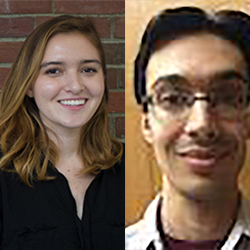Observational Astro Meeting: Ashley Villar & Charles D Kilpatrick

When:
Monday, October 28, 2019
2:00 PM - 3:30 PM CT
Where: 1800 Sherman Avenue, 4-4430, Evanston, IL 60201 map it
Audience: Faculty/Staff - Student - Post Docs/Docs - Graduate Students
Cost: Free
Contact:
Lisa Raymond
(847) 491-8646
Group: CIERA - Observational Astronomy Meetings
Category: Lectures & Meetings
Description:
Monday Observational Meetings for Northwestern University's Center for Interdisciplinary Exploration and Research in Astrophysics (CIERA), this week featuring:
Ashley Villar (Harvard University)
Title: Time-domain Astrophysics in the Era of Big Data
Abstract:
The Large Synoptic Survey Telescope (LSST) will begin science operations in 2023 and is expected to increase the discovery rate of extragalactic transients by two orders of magnitude. With this transition comes the important question: how do we classify these events and separate the interesting “needles” from the “haystack” of objects? While it’s necessary to pick out these needles, it is equally important to understand the haystack — or the millions of events which lack any multi wavelength or spectroscopic followup.
In this talk, I will discuss ongoing efforts to classify and characterize the future haystack. In particular, I will introduce two methods to classify supernovae based on their optical light curves, which have been trained and tested on data from the Pan-STARRS Medium Deep Survey. The first method combines Bayesian model fitting with a variety of supervised classification methods, while the second method uses a semi-supervised method (a recurrent neural network-based autoencoder). I will then discuss how well we can extract physical insights from LSST-like light curves without additional followup. I will focus on the rare class of Type I superluminous supernovae as a case study, and I show that we can determine key physical properties of their engine for a significant fraction of events, indicating that population studies of rare transients will be possible with LSST.
Host: Raffaella Margutti / Peter Blanchard
Charles D Kilpatrick (UCSC)
Title: The progenitor stars of core-collapse supernovae
Abstract: The progenitor stars of core-collapse supernovae (SNe) come from stellar populations with a wide variety of initial masses, multiplicities, and local environments. It is now possible to directly tie these stars to their resulting explosions in order to better understand their evolutionary pathways and ignition mechanisms. However, this is only possible for the closest (<30 Mpc) SNe and for those with deep, high-resolution pre-explosion imaging, usually from the Hubble Space Telescope. I will discuss the growing population of such SN progenitor stars and the observing and analysis techniques used to look back before the explosion and characterize these valuable sources. I will then discuss trends found in this population, focusing on the "missing" high-mass red supergiant progenitors of hydrogen-rich SNe (the so-called red supergiant problem) and evidence for binary star progenitors of stripped-envelope SNe.
Host: Kerry Paterson